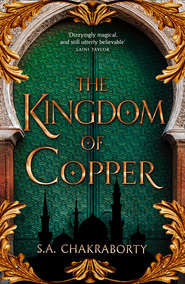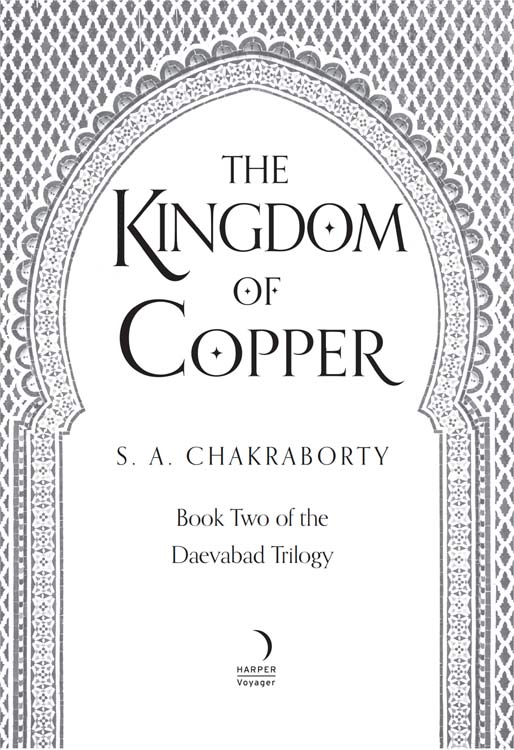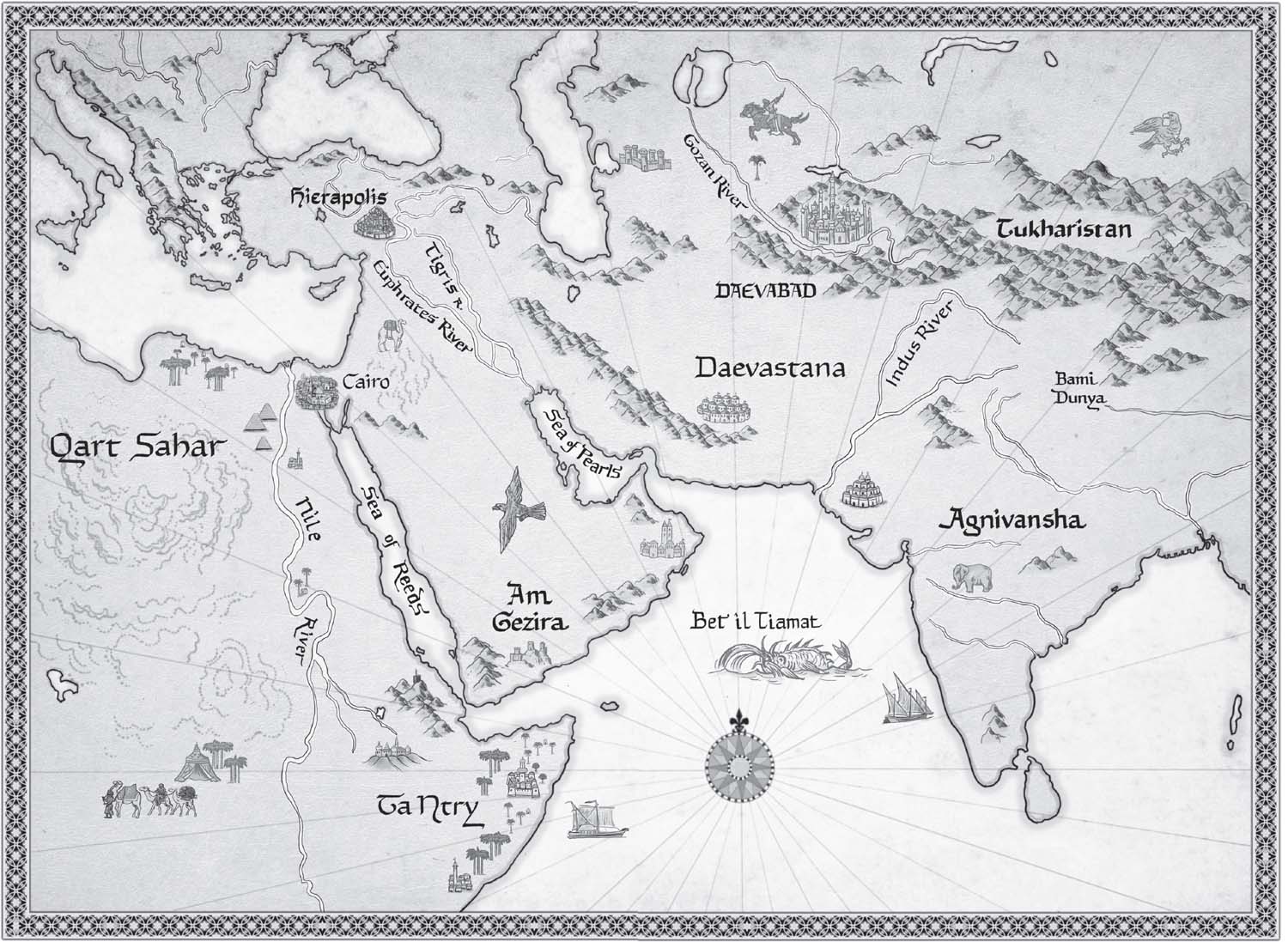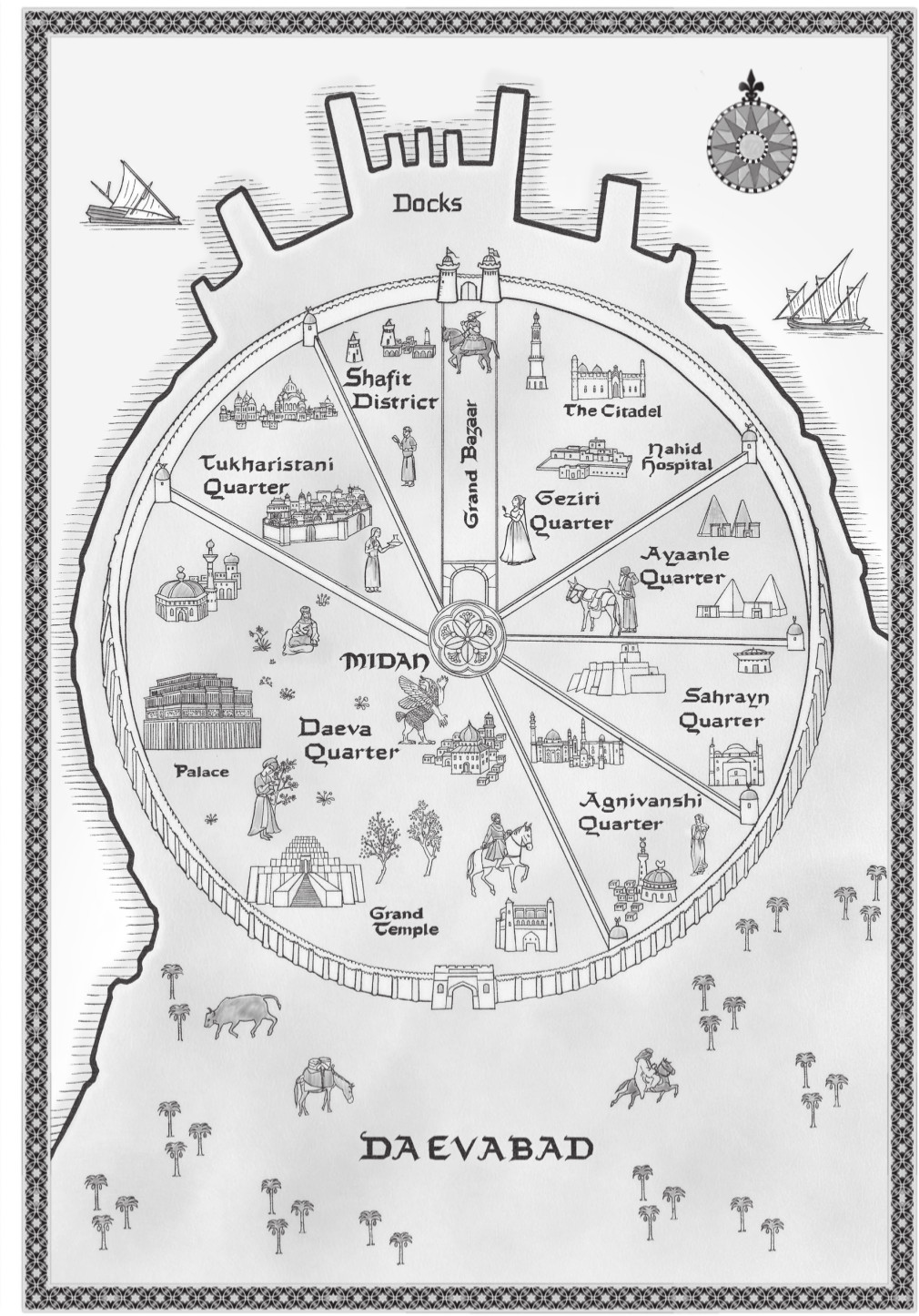
Полная версия:
The Kingdom of Copper


Copyright
HarperVoyager
An imprint of HarperCollinsPublishers Ltd
1 London Bridge Street
London SE1 9GF
www.harpercollins.co.uk
First published in Great Britain by HarperVoyager 2019
Copyright © S.A. Chakraborty 2019
Cover design Micaela Alcaino © HarperCollinsPublishers Ltd 2019
Cover photographs © Shutterstock.com
Designed by Paula Russell Szafranski
Map copyright © Nicolette Caven
S.A. Chakraborty asserts the moral right to be identified as the author of this work.
A catalogue copy of this book is available from the British Library.
This novel is entirely a work of fiction. The names, characters and incidents portrayed in it are the work of the author’s imagination. Any resemblance to actual persons, living or dead, events or localities is entirely coincidental.
All rights reserved under International and Pan-American Copyright Conventions. By payment of the required fees, you have been granted the non-exclusive, non-transferable right to access and read the text of this e-book on screen. No part of this text may be reproduced, transmitted, down-loaded, decompiled, reverse engineered, or stored in or introduced into any information storage and retrieval system, in any form or by any means, whether electronic or mechanical, now known or hereinafter invented, without the express written permission of HarperCollins.
Source ISBN: 9780008239442
Ebook Edition © February 2019 ISBN: 9780008239466
Version: 2019-01-07
Dedication
FOR SHAMIK
Contents
Cover
Title Page
Copyright
Dedication
Maps
Prologue
Chapter 1: Nahri
Chapter 2: Ali
Chapter 3: Nahri
Chapter 4: Dara
Chapter 5: Ali
Chapter 6: Nahri
Chapter 7: Dara
Chapter 8: Ali
Chapter 9: Ali
Chapter 10: Nahri
Chapter 11: Ali
Chapter 12: Nahri
Chapter 13: Nahri
Chapter 14: Dara
Chapter 15: Ali
Chapter 16: Dara
Chapter 17: Nahri
Chapter 18: Nahri
Chapter 19: Dara
Chapter 20: Ali
Chapter 21: Nahri
Chapter 22: Ali
Chapter 23: Nahri
Chapter 24: Dara
Chapter 25: Ali
Chapter 26: Nahri
Chapter 27: Ali
Chapter 28: Nahri
Chapter 29: Ali
Chapter 30: Nahri
Chapter 31: Ali
Chapter 32: Nahri
Chapter 33: Ali
Chapter 34: Nahri
Chapter 35: Nahri
Chapter 36: Ali
Chapter 37: Dara
Chapter 38: Nahri
Chapter 39: Dara
Chapter 40: Nahri
Chapter 41: Dara
Epilogue
Cast of Characters
Glossary
The Six Tribes of the Djinn
Acknowledgements
Also by S. A. Chakraborty
About the Publisher
Maps


PROLOGUE
ALI
Alizayd al Qahtani didn’t make it a month with his caravan.
“Run, my prince, run!” the sole Ayaanle member of his traveling party cried as he staggered into Ali’s tent one night when they were camped along a southern bend of the Euphrates. Before the man could say more, a blood-dark blade burst from his chest.
Ali flew to his feet. His weapons already at hand, he slashed the back of the tent open with a strike of his zulfiqar and fled into the darkness.
They pursued him on horseback, but the Euphrates glistened close ahead, black as the star-drenched night reflected in the river’s coursing surface. Praying his weapons were secure, Ali plunged into the water as the first arrows flew, one whistling past his ear.
The cold water was a shock, but Ali swam fast, the motion as instinctual as walking, faster than he ever had, with a grace that would have taken him aback had he not been preoccupied with saving his life. Arrows struck the water around him, following his path, and so he dived deep, the water growing murky. The Euphrates was wide, and it took him time to cross, to push through waterweeds and fight the fierce current trying to drag him downstream.
It was only when he was staggering up the opposite bank that the sick realization swept over him: he had not needed to emerge for air the entire time.
Ali gulped, shivering as a cold breeze stole through his wet dishdasha. Nausea rose in his chest, but there was little time to contemplate what had happened in the river—not when mounted archers were pacing on the other side. His tent was aflame, but the rest of the camp looked untouched and eerily still, as though a quiet command had been passed among the other travelers in his party to ignore the screams they might hear tonight.
Ali had been betrayed. And he was not waiting around to find out if either the assassins or his traitorous companions could cross the river. He stumbled to his feet and ran for his life, racing headlong toward the opposite horizon.
Dawn had broken by the time his legs finally gave out. He collapsed, landing hard on the golden sand. The river was long gone. In every direction was desert, the sky a bright, hot bowl turned upside down.
Ali’s gaze darted across the still landscape as he fought for breath, but he was alone. Relief and fear warred through him. He was alone—with a vast desert before him and enemies at his back, his only possessions his zulfiqar and khanjar. He had no food, no water, no shelter. He hadn’t even had time to grab the turban and sandals that might have protected him from the heat.
He was doomed.
You were already doomed, you fool. Your father made that clear. Ali’s exile from Daevabad was a death sentence, one obvious to anyone with knowledge of the politics of his tribe. Did he really think he could fight it? That his death would be easy? If his father had wanted to be merciful, he would have had his youngest son strangled in his sleep within the city’s walls.
For the first time, a twinge of hate clawed up in Ali’s heart. He didn’t deserve this. He had tried to help his city and his family, and Ghassan wasn’t even generous enough to give him a clean death.
Angry tears pricked his eyes. Ali wiped them away roughly, feeling disgusted. No, this wouldn’t be how things ended for him, weeping tears of self-pity and cursing his family as he wasted away in some unknown patch of sand. He was Geziri. When the time came, Ali would die dry-eyed, with the declaration of faith on his lips and a blade in his hand.
He fixed his eyes southwest, in the direction of his homeland, the direction he’d prayed his entire life, and dug his hands in the golden sand. Ali went through the motions to cleanse himself for prayer, the motions he’d made multiple times a day since his mother had first shown him how.
When he finished, he raised his palms, closing his eyes and catching the sharp scent of the sand and salt clinging to his skin. Guide me, he begged. Protect those I was forced to leave behind and when my time comes—his throat thickened—when my time comes, please have more mercy on me than my father did.
Ali touched his fingers to his brow. And then he rose to his feet.
Having nothing but the sun to guide him through the unbroken expanse of sand, Ali followed its relentless path across the sky, ignoring and then growing accustomed to its merciless heat upon his shoulders. The hot sand scorched his bare feet—and then it didn’t. He was a djinn, and though he couldn’t drift and dance as smoke among the dunes the way his ancestors had done before Suleiman’s blessing, the desert would not kill him. He walked each day until exhaustion overtook him, only stopping to pray and sleep. He let his mind—his despair at how completely he’d ruined his life—drift away under the white, bright sun.
Hunger gnawed at him. Water was no problem—Ali had not thirsted since the marid took him. He tried hard not to think about the implication of that, to ignore the newly restless part of his mind that delighted in the dampness—he refused to call it sweat—beading on his skin and dripping down his limbs.
He could not say how long he’d been walking when the landscape finally changed, rocky cliffs emerging from the sandy dunes like massive, grasping fingers. Ali scoured the craggy bluffs for any sign of food. He’d heard rural Geziris were able to conjure entire feasts from human scraps, but Ali had never been taught such magic. He was a prince raised to be a Qaid, surrounded by servants his entire privileged life. He had no idea how to survive on his own.
Desperate and starving, he ate any bit of greenery he could find down to the roots. It was a mistake. The following morning, he awoke violently ill. Ash crumbled from his skin, and he vomited until all that came up was a fiery black substance that burned the ground.
Hoping to find a bit of shade in which to recover, Ali tried to climb down from the cliffs, but he was so dizzy that his vision blurred and the path danced before him. He lost his footing on the loose gravel almost immediately and slipped, tumbling down a sharp incline.
He landed hard in a stony crevasse, smashing his left shoulder into a protruding rock. There was a wet pop, and a searing heat burst down his arm.
Ali gasped. He tried to shift and then yelped, a sharp pain shooting through his shoulder. He sucked for air through his teeth, biting back a curse as the muscles in his arm spasmed.
Get up. You will die here if you do not get up. But Ali’s weakened limbs refused to obey. Blood trickled from his nose, filling his mouth as he stared helplessly at the stark cliffs outlined against the bright sky. A glance at the crevasse revealed nothing but sand and stones. It was—rather fittingly—a dead place.
He choked back a sob. There were worse ways to die, he knew. He could have been caught and tortured by his family’s enemies or hacked apart by assassins eager to claim bloody “proof” of their victory. But God forgive him, Ali was not ready to die.
You are Geziri. A believer in the Most Merciful. Do not dishonor yourself now. Shaking, Ali squeezed his eyes against the pain, trying to find some peace in the holy passages he’d memorized so long ago. But it was difficult. The faces of those he’d left behind in Daevabad—the brother whose trust he’d finally lost, the friend whose love he’d killed, the father who’d sentenced him to death for a crime he hadn’t committed—kept breaking through the encroaching darkness, their voices taunting him as he slowly slipped away.
He woke to an impossibly foul substance being forced down his throat.
Ali’s eyes shot open and he gagged, his mouth full of something crunchy and metallic and wrong. His vision swam, slowly focusing on the silhouette of a broad-shouldered man squatting beside him. The man’s face came to him in patches: a nose that had been broken more than once, a matted black beard, hooded gray eyes.
Geziri eyes.
The man laid a heavy hand on Ali’s brow and spooned another thick helping of the disgusting gruel into his mouth. “Eat up, little prince.”
Ali choked. “W-what is that?” His voice was barely a whisper in his parched throat.
The other djinn beamed. “Oryx blood and ground locusts.”
Ali’s stomach immediately rebelled. He turned his head to throw up, but the man clamped his hand over Ali’s mouth and massaged his throat, forcing the revolting mixture back down.
“Aye, do not be doing that. What kind of man turns down food that his host has so thoughtfully prepared?”
“Daevabadis.” A second voice spoke up, and Ali glanced down at his feet, catching sight of a woman with thick black braids and a face that might have been carved from stone. “No manners.” She held up Ali’s zulfiqar and khanjar. “Lovely blades.”
The man held up a gnarled black root. “Did you eat something like this?” When Ali nodded, he snorted. “Fool. You’re lucky not to be a pile of ash right now.” He shoved another spoonful of the bloody gristle at Ali. “Eat. You’ll need your strength for the journey home.”
Ali pushed it weakly away, still dazed and now thoroughly confused. A breeze swept through the crevasse, drying the dampness that clung to his skin, and he shivered. “Home?” he repeated.
“Bir Nabat,” the man said as if it was the most obvious thing in the world. “Home. It is but a week’s travel west.”
Ali tried to shake his head, but his neck and shoulders had gone stiff. “I can’t,” he rasped out. “I … I’m going south.” South was the only direction he could think to go; the Qahtani family originally hailed from the forbidding mountain chain along Am Gezira’s humid southern coast, and it was the only place he could think to find allies.
“South?” The man laughed. “You are mostly dead and you think to cross Am Gezira?” He thrust another spoonful into Ali’s mouth. “There are assassins looking for you in every shadow of this land. Word is the fire worshippers will make rich the man who kills Alizayd al Qahtani.”
“Which is what we should be doing, Lubayd,” the other raider cut in. She nodded rudely at the gruel. “Not wasting our provisions on a southern brat.”
Ali swallowed back the vile concoction with difficulty, narrowing his eyes at her. “You’d kill a fellow Geziri for foreign coins?”
“I’d kill a Qahtani for free.”
Ali started at the hostility in her voice. The man—Lubayd—sighed and shot her an annoyed look before turning back to Ali. “You’ll forgive Aqisa here, prince, but it’s not a good time to be visiting our land.” He put down the clay cup. “We haven’t seen a drop of rain in years. Our spring is drying up, we’re running out of food, our babies and old folk are dying … So we send messages to Daevabad pleading for help. And do you know what our king says, our fellow Geziri king?”
“Nothing.” Aqisa spat at the ground. “Your father doesn’t even respond. So do not speak of tribal ties to me, al Qahtani.”
Ali was too tired to be frightened by the hatred in her face. He eyed the zulfiqar in her hands again. He kept his blade sharp; at least this ordeal would finally end quickly should they choose to execute him with it.
He choked back another wave of bile, the oryx blood thick in his throat. “Well …,” he started weakly. “In that case I agree. You needn’t waste that on me.” He nodded at Lubayd’s gruel.
There was a long moment of silence. Then Lubayd burst into laughter, the sound ringing out across the crevasse.
He was still laughing when he grabbed Ali’s injured arm without warning and pulled it firmly straight.
Ali cried out, black spots blossoming across his vision. But as his shoulder slid back into place, the searing pain immediately lessened. His fingers tingled, sensation returning to his numb hand in excruciating waves.
Lubayd grinned. He removed his ghutra, the cloth headdress worn by northern Geziri djinn, and quickly fashioned it into a sling. Then he hauled Ali to his feet by his good arm. “Keep your sense of humor, boy. You’re going to need it.”
A massive white oryx waited patiently at the mouth of the crevasse; a line of dried blood crossed one flank. Ignoring Ali’s protests, Lubayd shoved him up onto the animal’s back. Ali clutched its long horns, watching as Lubayd wrestled his zulfiqar away from Aqisa.
He dropped it in Ali’s lap. “Let that shoulder heal and perhaps you’ll swing this again.”
Ali gave the blade an incredulous look. “But I thought …”
“We’d be killing you?” Lubayd shook his head. “No. Not yet, anyway. Not while you are doing that.” He motioned back to the crevasse.
Ali followed his gaze. His mouth fell open.
It wasn’t sweat that had soaked his robe. A miniature oasis had sprung up around him while he lay dying. A spring gurgled through the rocks where his head had been, trickling down a path shrouded with new moss. A second spring bubbled up through the sand, filling the depression his body had left. Bright green shoots covered a bloody patch of gravel, their unfurling leaves wet with dew.
Ali took a sharp breath, scenting the fresh moisture on the desert air. The potential.
“I have no idea how you did that, Alizayd al Qahtani,” Lubayd said. “But if you can draw water into a barren patch of sand in Am Gezira, well …” He winked. “I’d say you’re worth far more than a few foreign coins.”
NAHRI
It was very quiet inside Emir Muntadhir al Qahtani’s apartment.
Banu Nahri e-Nahid paced the room, her bare toes sinking into the sumptuous carpet. Upon a mirrored table, a bottle of wine rested beside a jade cup carved in the shape of a shedu. The wine had been brought in by the calm-eyed servants who’d helped Nahri out of her heavy wedding clothes; perhaps they’d noticed the Banu Nahida’s trembling and thought it would help.
She stared at the bottle now. It looked delicate. It would be easy to break it, easier still to conceal a glass shard under the pillows of the large bed she was trying not to look at and end this evening in a far more permanent way.
And then you will die. Ghassan would put a thousand of her tribesmen to the sword, make Nahri watch each one, and then throw her to his karkadann.
She tore her gaze from the bottle. A breeze came from the open windows, and she shivered. She’d been dressed in a delicate blue silk shift and soft hooded robe, neither of which did much to ward off the chill. All that was left of the overly elaborate outfit in which she’d been wed was her marriage mask. Made of finely carved ebony and secured by copper clasps and chains, the mask was engraved with her and Muntadhir’s names. It was to be burned upon consummation, the ash marking their bodies the next morning proof of the marriage’s validity. It was—according to the excited Geziri noblewomen teasing her earlier at the wedding dinner—a beloved tradition of their tribe.
Nahri didn’t share their excitement. She’d been sweating since she entered the room, and the mask kept sticking to her damp skin. She pulled it slightly loose, trying to let the breeze cool her flushed cheeks. She caught the reflection of her movement in the massive bronze-edged mirror across the room and averted her eyes. However fine the clothes and mask, they were Geziri, and Nahri had no desire to see herself in the garb of her enemy.
They’re not your enemy, she reminded herself. “Enemy” was Dara’s word, and she was not going to think about Dara. Not tonight. She couldn’t. It would break her—and the last Banu Nahida of Daevabad was not going to break. She’d signed her wedding contract with a steady hand and toasted Ghassan without trembling, smiling warmly at the king who’d threatened her with the murder of Daeva children and forced her to disown her Afshin with the crudest of charges. If she could handle all of that, she could handle whatever happened in this room.
Nahri turned to cross the bedroom again. Muntadhir’s vast apartment was located on one of the upper levels of the enormous ziggurat at the heart of Daevabad’s palace complex. It was filled with art: paintings on silk screens, delicate tapestries, and finely wrought vases, all of which had been carefully displayed and all of which seemed to carry an aura of magic. She could easily envision Muntadhir in this wondrous room, lounging with a cup of expensive wine and some cosmopolitan courtesan, quoting poetry and bantering about the useless pleasures of life that Nahri had neither the time nor inclination to pursue. There was not a book in sight. Not in this room, nor in the rest of the apartment she’d been guided through.
She stopped to stare at the closest painting, a miniature of two dancers conjuring flamelike flowers that sparked and flashed like hearts of ruby as they twirled.
I have nothing in common with this man. Nahri couldn’t imagine the splendor in which Muntadhir had been raised, couldn’t imagine being surrounded by the accumulated knowledge of millennia and not bothering to learn how to read. The only thing she shared with her new husband was one awful night upon a burning ship.
The bedroom door opened.
Nahri instinctively stepped back from the painting, pulling her hood low. There was a soft crash from outside, followed by a curse, and then Muntadhir entered.
He wasn’t alone; indeed, she suspected he might not have made it alone, for he was leaning heavily on a steward, and she could practically smell the wine on his breath from across the room. A pair of female servants followed, and Nahri swallowed as they helped him out of his robe, unwinding his turban with a number of what sounded like teasing jests in Geziriyya, before leading him to the bed.
He sat heavily on the edge, looking drunk and somewhat stunned to find himself there. Heaped with cloudlike linens, the bed was big enough to fit a family of ten—and given the rumors she’d heard whispered about her husband, she suspected he’d filled it on many an occasion. Frankincense smoldered in a corner burner beside a chalice of sweetened milk mixed with apple leaves—a traditional Daeva drink brewed for new brides hoping to conceive. That, at least, would not be happening—Nisreen had assured her. One did not assist Nahid healers for two centuries without learning a number of nearly foolproof methods to prevent pregnancy.
Even so, Nahri’s heart beat faster as the servants left, closing the door softly behind them. Tension filled the air, thick and heavy and at awkward odds with the sounds of celebration in the garden below.
Muntadhir finally glanced up, meeting her eyes. Candlelight played on his face. He might not have had Dara’s literally magical beauty, but he was a strikingly handsome man, a charismatic man, she’d heard, one who laughed easily and smiled often … at least with people who weren’t her. His thick black hair was cut short, his beard stylishly trimmed. He’d worn his royal regalia for the wedding, the gold-trimmed ebony robe and patterned blue, purple, and gold silk turban that were the hallmarks of the ruling al Qahtani family, but he was dressed now in a crisp white dishdasha edged with tiny pearls. The only thing detracting from his careful appearance was a thin scar dividing his left eyebrow—a remnant from Dara’s scourge.
They stared at each other for a long moment, neither one moving. She saw that beneath the edge of drunken exhaustion, he too looked nervous.
Finally he spoke. “You’re not going to give me plague sores, are you?”
Nahri narrowed her eyes. “Excuse me?”



